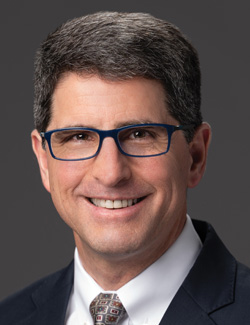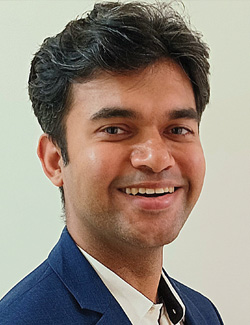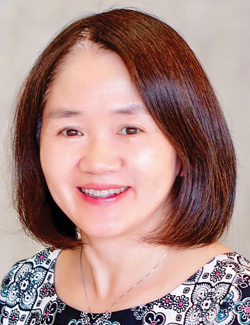The Optica election for the 2024 Vice President and two new Directors-at-Large will open on 12 July 2023. Please read the candidates’ statements and cast your ballot. Instructions for electronic voting will be sent to all eligible voters. If you do not receive voting materials, email voting@optica.org or call +1.202.416.1913.
Polls will remain open until 8 September 2023. Results will be announced at Optica’s Annual Business Meeting on Tuesday, 10 October 2023. They will also be available on the Optica website in mid-October. For biographical information about the candidates, visit optica.org/optica_election.
Candidates for Vice President

Gisele Bennett
MEPSS LLC, USA
In the late 1980s, leading experts in the field of atmospheric turbulence encouraged me to submit a paper to the annual OSA meeting. That submission began my long involvement with OSA, now Optica. Decades later, the quality of Optica remains strong and the network of scientists and engineers is invaluable.
My many volunteer hours have certainly been worthwhile to me, and I hope to Optica as well. I have gained new friends and colleagues because of the Optica connection, through committees, conferences, publications and networking events. My volunteer efforts include editor-in-chief for Applied Optics (current); member, Strategic Planning Committee (current); Board of Directors (2018–2020); division chair for Information Acquisition, Processing and Display, and thus Board of Meetings representative (2016–2018); Imaging Congress chair; topical-meeting committee chair and member; Fredric Ives Medal/Jarus W. Quinn Prize Award Committee, Forman Engineering Excellence Award Committee and Esther Hoffman Beller Award Committee (chair and member); publications reviewer; and Optica Traveling Lecturer.
I managed a large, rapidly growing applied research lab at Georgia Tech. The growth of that lab was caused by quality researchers with a passion for making a difference. I created an environment for interdisciplinary research with a diverse group of motivated researchers. The researchers came from different disciplines with backgrounds in physics, engineering, math, chemistry, business, atmospheric science and international affairs. We had multiple generations in our workforce. The composition of my former lab is very similar to that of Optica—except Optica has a global reach.
If elected, my priorities will be:
Increase mentorship opportunities. I believe that supporting and providing a fertile environment for mentorship is critical for professional and personal growth and for the overall success of our organization and individual members. Such relationships benefit the mentor and mentee. Mentors have an opportunity to reach a global community which multiplies the impact and legacy of their work. Mentees gain opportunities to enhance their skills, create networks and leverage the experience of expanding their network beyond their immediate connections. I want to create an opportunity for mentors and mentees to connect through Optica.
Increase educational opportunities. Access to educational material is vital to professional growth for our society and individual members. As professionals we must continue to learn or atrophy. We have transitioned into a lifelong-learning environment that enables growth and career-path pivots. Creating and making educational material accessible to the membership is an opportunity to leverage Optica’s global expertise and to reach a global audience. We can open the aperture for both practicing professionals and future scientists and engineers through expanding our educational offerings.

Turan Erdogan
Plymouth Grating Laboratory, Inc., USA
Optica is at the very least a community. For some, the experience is so intimate it might even be considered a family. The health of a community—or a family—is at least in part determined by the health of its individual members. But I believe it’s more than that. The community itself can be strong or weak, vibrant or flaccid, alive or dead. And surely its health is also indicated by its external impact. Strong communities make a difference to people outside of the community.
I am excited to play a part in continuously improving the health of the Optica community. But how can we tell whether our health is improving or not? Peter Drucker said, “If you can’t measure it, you can’t improve it.” In optics, our minds immediately go to the frustration we would feel trying to polish a lens or mirror without a good test plate or Fizeau interferometer.
Measuring the health of a business is straightforward. Financial metrics rule. You’ve got to see growth of both the top line (revenue) and the bottom line (profit). Growth of revenue without profit is useless. And growth of profit without revenue is almost never sustainable.
But what about measuring the health of Optica? What metrics should we focus on? For a community like ours, I believe the membership count is like revenue, and the impact we have is like profit. Just as revenue growth is a no-brainer for businesses, so is membership growth for Optica. If we’re not adding to our numbers, we’re probably not as healthy as we should be.
Impact, or the bottom line, is a little more subtle. Impact should be measurable for each of the three beneficiaries of a healthy community listed above: individual members, the community itself and people outside the community.
Are Optica members truly benefiting from Optica? Are their careers advancing more rapidly? Are they learning new things, and being inspired to develop, invent and create new ideas, theories or products?
How about the community itself? Are we connecting more globally than ever before? Are we growing more intimate? Are we blurring the lines that seem to be naturally drawn by geographic borders, gender and professional affiliation—or even making them transparent?
Finally, how is Optica impacting society outside of our community? Are we making it easier for great science to be done that will benefit people for generations to come? Are we facilitating the creation of great companies and helping established companies to thrive?
I am eager to work with Optica leaders, staff and members to refine the metrics for improving the health of our society. Having served on Optica’s Board of Directors, several councils including OIDA, several awards committees, and several conference committees, and having co-chaired a number of Optica conferences, including FiO-LS and OFC, I believe I have the experience to find new and more effective ways to review and assess these metrics, and to set the right priorities which enable us to act on what we’ve learned.
Candidates for Director-at-Large

Martin J. Booth
University of Oxford, UK
I am immensely honored to be nominated as a candidate for the Optica Board of Directors. If elected, I will be grateful to be given the opportunity to contribute to the leadership of the society, which has been the most important to me personally since I joined as a graduate student around 25 years ago.
Optica plays a vital role in the optics and photonics community, through its publications, meetings, networks and advocacy for our field. I am enthusiastic to serve this community, from which I have significantly benefited, and to directly help shape the future strategy for Optica. I believe that my leadership experience in the field of optics and photonics means that I can make valuable contributions across Optica’s remit.
I am always impressed by the degree to which optics enables work in other scientific disciplines and how it is the basis for a wide range of technological applications. In my own work, I have enjoyed covering a breadth of activities from theoretical optics through to commercialization. It will be important to strengthen Optica’s ability to cover the wide range of members’ interests not only across optics specializations, but the applications it enables and the spectrum of technology development.
Optica can play a particular role in linking career stages, from nurturing early interest in optics for students through to senior leaders in research and industry. Developing the careers of early-career researchers is a key interest of mine, as illustrated through my commitment to researcher networks and establishment of the Optica student chapter in my own institution. We should ensure that Optica expands its platform to connect and inspire the optics community.
Scientific publishing has seen many changes over the past few years, as technology, policy and research culture change. It is vital that professional organizations like Optica maintain a position of strength in upholding standards and recognizing quality, whether in the content itself, or in the work of reviewers and editors who keep the processes running. We must do this while keeping up with innovations in publishing and the changing needs of our scientific community.
Optica should be agile in adaptation to changes in the way we work. It has led the way in facilitating hybrid conferences, which are ever more important as we meet various challenges to conventional meetings. The demands on members’ time due to work or family commitments, obstacles to obtaining visas, environmental concerns and simply cost can make attendance highly challenging. These factors have greater detrimental effects on certain sections of our community—particularly women and those from lower-resource countries—than on others. It is therefore imperative that we innovate further to provide the best service with increased inclusivity across the whole of our membership, as it is vital to the long-term success of the society.

Caroline Boudoux
Polytechnique Montréal, Canada
Nine out of ten. According to the US National Science Foundation Survey of Doctorate Recipients, for every 10 Ph.D.s we train, fewer than one becomes a university professor. More than 90% of Ph.D.s, scientists and engineers find careers in industry, vastly exceeding those remaining in academia. Yet our training curricula, especially in graduate education, are mostly tailored toward the needs of academic researchers.
As a director-at-large of Optica, using my privileged vantage point as both a university professor and a tech business cofounder, I will work toward Optica becoming a leader in the innovation cycle, by building more bridges between its excellent scientific and industrial communities. At the senior level, through Optica’s Board of Meetings, we have encouraged meeting chairs to create an Industry Chair position to help design activities tailored to the needs of the industry. At the junior level, I will keep participating on panels in Optica’s Amplify and IONS programs, to shine light on different career prospects centered on optics and photonics technologies and to help identify adequate mechanisms to break the remaining silos between members of our community.
41 in 500. In 2023, 41 persons who identify as women occupy CEO positions in S&P 500 companies. For the first time, there are more women CEOs than there are men CEOs called John! In optics, as in any STEM field, not only are women, BIPOC and LGBTQ2S+ persons significantly underrepresented, but the pipeline to positions of leadership—in industry, government and academia—is seriously leaking.
Optics has such an important role to play in addressing the world’s most pressing challenges, we cannot afford to let talent fall away based on misconceptions or incomprehension. Optica has an impressive track record in creating awareness and mentorship programs for all. As a director-at-large, I will continue spreading the word (on the air and podcast of CBC/Radio-Canada, in classrooms and summer schools around the world, and through my books) and explore novel platforms, such as hybrid (and sometimes free) Optica meetings, to discuss science, technology and meaningful change with members from every corner of the globe.
50 weeks. As a rookie mom, I have benefited from Optica’s family-care grant and from Québec’s flexible parental-leave conditions. The opportunity I had for extended leave had such a profoundly positive impact on both my family and my career and yet is not available to most. I pledge to use my voice as an Optica director-at-large to promote adequate support and encourage members to both value and achieve work-life balance.

Amol Choudhary
Indian Institute of Technology (IIT)
Delhi, India
I am thrilled to have been nominated to the Board of Directors of our society. Optica holds a very special place in my heart, as I have been a dedicated member of the society for almost 15 years.
I have been active in Optica, from being a student chapter committee member to a conference technical-program committee member and from being the winner of the society’s Ivan P. Kaminow Outstanding Early Career Professional prize to serving on a governance council. I have seen firsthand the incredible impact that Optica has had on the field of optics and photonics, as well as on my career path. Therefore, the opportunity to contribute to such a remarkable community and help shape Optica’s future as a board member is truly an honor.
As an Optica Ambassador, I was privileged to visit more than 15 student chapters in developing nations and to interact with students and early-career professionals. During my visits, I had the invaluable opportunity for detailed and often passionate conversations about their challenges and aspirations. I will support creating resources and services for career development for students and young professionals. I believe that supporting and empowering the next generation of leaders in our field can ensure a bright future for all of us. I will also engage with students and gather their feedback, to serve our students and the early-career community better.
With experience working in six countries and three continents, I understand our global membership’s diverse needs and perspectives. I am passionate about ensuring that all members of our community have a voice in the future direction of Optica. I will strive to improve awareness of various funding opportunities offered by Optica and the Optica Foundation in developing nations. I will ensure that more opportunities are made available in these regions, including opportunities to access testbeds in collaborating industry and academic institutions, organization of high-quality conferences in these regions and more scholarship opportunities. I will also encourage “Optica Week,” which will promote optics and include professional-development programs and practical skill-development workshops. Together, we can create a more inclusive and collaborative society representing the best of our field.
Last but not least, I feel that Optica can act as an interface between academia and industry to bring them closer together in a feedback loop, where new academic research determines product development in industry and new industrial requirements determine the academic research areas. To this end, I will promote several initiatives, including outreach programs, where student chapters and postdocs will have opportunities to develop strong industry collaborations. Furthermore, I plan to increase membership programs catering to industry members at the early- and mid-career stages.
My passion and dedication to this society extends far beyond this election. I want to work with all of you to benefit our community, which brings light to our daily lives. Thank you for considering my candidacy.

Hong Hua
University of Arizona, USA
I am truly honored to be nominated as an at-large candidate for the Optica Board of Directors. Optica has been my principal professional home since 1999. Throughout my academic career, Optica publications and meetings have been the critical venues for publishing and discovering important technical advancements and interacting with peers.
My volunteering on Optica conferences and committees has resulted in many professional associations and friendships and created opportunities to expand my professional network and knowledge. For instance, my early involvement as a cochair to organize the 2008 OSA Workshop on Illumination Modulation; the 2009 OSA Symposium on the Future of 3D Display: The Marketplace and the Technology; and the 2012 OSA 3D Display Technology Incubator Meeting have paved the way for a successful launch, in 2016, of the Optica topical meeting on 3D Image Acquisition and Display. This topical meeting has grown steadily and has become one of the important venues at the annual Optica Imaging Congress. As an extension to this topical meeting, I served as a guest editor for several Optics Express feature issues.
If elected, I will work closely with the Optica leadership and staff as well as the optics community to promote Optica’s core values of innovation, integrity, inclusivity and impact. More specifically, I will help to:
Ensure that Optica meetings and publications remain a beacon of quality, integrity and innovation for optics and photonics. I will stay vigilant on emerging research areas and facilitate the promotion of new topics and interests through Optica meetings and publications. I recognize that enhancing the quality and integrity of publications requires the collaborative effort of Optica reviewers, editors, conference committee members and chairs, and I will support measures to ensure transparent and rigorous peer-review processes.
Enhance diversity, equity, inclusion and accessibility (DEIA). Through my role as a conference chair, I recognize that DEIA is an integral part of Optica’s core values. Optica has traditionally excelled at connecting people of different ethnic groups across our global community. During the COVID-19 pandemic, Optica quickly embraced online conferences, which enabled many more people around the world—especially students and early-career professionals, as well as scientists from developing regions—to participate and to learn. By exploring different models of hybrid conferences and online meetings, I will help create opportunities for education, career development and mentoring, help make research and knowledge accessible and affordable, and explore measures that can improve the participation and leadership roles of underrepresented and disadvantaged groups in Optica meetings and committees.
Broaden impact and collaboration. Optics and photonics are woven into the fabric of modern society and have become fundamentally important across many disciplines. I am keen to help create opportunities for collaboration with other professional communities and develop outreach activities to excite young people’s interest in optics and photonics.
Thanks to the members of the Nominating Council who prepared the 2023 slate.
Arlene Smith, Molex, Inc., USA, Chair
Roel G.F. Baets, Ghent University, INTEC, Belgium
Connie J. Chang-Hasnain, Berxel Photonics, China
Stephen Fantone, Optikos, USA
Ekaterina Golovchenko, Edmund Optics Inc., USA
Min Gu, University of Shanghai for Science and Technology, China
Satoshi Kawata, Nanophoton Co. Ltd., Japan

